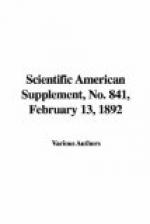Wuchang, on the Yangtsze opposite Hankow, is the capital of the two provinces Hupeh and Hunan. Here, every third year, the examination for competitors from both provinces is held, and a correspondent of the North China Herald, of Shanghai, describes the scene at the examination at the beginning of September last. The streets, he says, are thronged with long-robed, large-spectacled gentlemen, who inform the world at large by every fold of drapery, every swagger of gait, every curve of nail, that they are the aristocracy of the most ancient empire of the world. Wuchang had from 12,000 to 15,000 bachelors of arts within its walls, who came from the far borders of the province for the examination for the provincial degree. About one-half per cent. will be successful; thousands of them know they have not the shadow of a chance, but literary etiquette binds them to appear. In the wake of these Confucian scholars come a rout of traders, painters, scroll sellers, teapot venders, candle merchants, spectacle mongers, etc.; servants and friends swell the number, so that the examination makes a difference of some 40,000 or 50,000 to the resident population. In the great examination hall, which is composed of a series of pens shut off from each other in little rows of 20 or 30, and the view of which is suggestive of a huge cattle market, there is accommodation for over 10,000 candidates. The observance of rules of academic propriety is very strict. A candidate may be excluded, not only for incompetence, but for writing his name in the wrong place, for tearing or blotting his examination paper, etc. After the examination of each batch a list of those allowed to compete for honors is published, and the essay forms for each district are prepared with proper names and particulars. The ancestors of the candidate for three generations must be recorded, they must be free from taint of yamen service, prostitution, the barber’s trade and the theater, or the candidate would not have obtained his first degree. With the forms 300 cash (about 1s.) are presented to each candidate for food during the ordeal. The lists being thus prepared, on the sixth day of the eighth moon (Tuesday, the 8th of September, in 1891), the city takes a holiday to witness the ceremony of “entering the curtain,” i.e., opening the examination hall. For days coolies have been pumping water into great tanks, droves of pigs have been driven into the inclosure, doctors, tailors, cooks, coffins, printers, etc., have been massed within the hall for possible needs. The imperial commissioners are escorted by the examination officials to the place. A dozen district magistrates have been appointed to superintend within the walls, and as many more outside, two prefects have office inside, and the governor of the province has also to be locked up during the eight days of examination. The whole company is first entertained to breakfast at the yamen, and then the procession forms;




